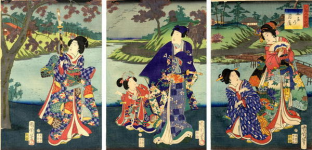That gardens in Heian Japan occupied a liminal position between the world of man-made objects and phenomena and materiality of the natural world is attested by Iroha jiruishō, which puts gardens in the category “earthly forms.” Like pavilions, gardens are man-made, yet form part of a scenic view as a collective manifestation of natural phenomena. Motonaka Makoto has shown that Heian assessments of gardens focused on two core concepts: the grounds or the lay of the garden (chikei), and the view (chōbō).
19 With “view” Heian courtiers often referred to what was visible beyond the residence and the garden itself. In other words, gardens combine ideas of a represented natural world and of viewed landscapes. Japan’s oldest extant treatise on garden design, the twelfth-century Sakuteiki (On creating gardens) opens with the exhortation that garden designs are best modeled after “landscapes in their innate disposition” (shōtoku no senzui).
20 It becomes apparent that landscape’s inherent state lies less in its details than in the idea of an essence it embodies. Gardens must strip the natural landscape down to express it satisfactorily. As Thomas Keirstead observes, “The garden must mirror nature, but a natural landscape is emphatically not the desired result.”
21 Gardens represent “nature” as summarized in a landscape so much more capably than nature itself manages, precisely because of their artifice.

